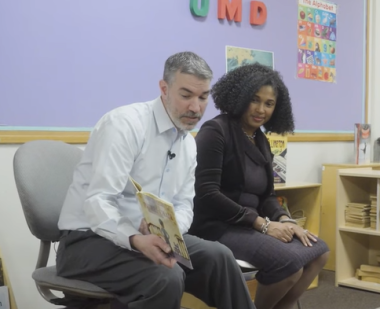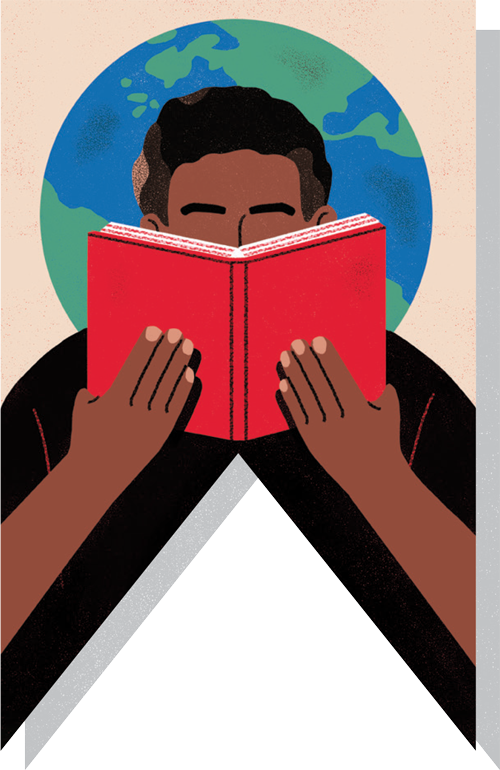
Supported by one of three Grand Challenges Institutional Grants awarded across the university, the Maryland Initiative for Literacy and Equity (MILE) aims to increase literacy in Maryland and the surrounding region through research, education, professional development, and community and policy outreach. It focuses on partnering with and addressing the needs of marginalized communities across race, culture, ethnicity and language, as well as neurodiverse populations. MILE intends to break down silos by bringing together brain and behavioral researchers, teachers, speech pathologists, librarians, policymakers, families and community members.
MILE is one of 11 projects involving College of Education faculty that were funded by Grand Challenges Grants earlier this year. In all, the university awarded more than $30 million to 50 projects addressing pressing societal issues, including educational disparities, social injustice, climate change, global health and threats to democracy. The Grand Challenges Grants Program is the largest and most comprehensive program of its type in the university’s history.
Donald J. Bolger, associate professor in the UMD College of Education, and Simone Gibson Ph.D. ’09 of Morgan State University lead MILE, which includes colleagues from the UMD College of Arts and Humanities, College of Behavioral and Social Sciences, College of Information Studies, School of Public Policy and College of Education.
Bolger discusses the innovative ways MILE is addressing literacy in Maryland and why this work is so crucial to both individuals and society.

What is the current status of literacy in the state of Maryland? How does literacy affect different aspects of people’s lives and society?
Half of Maryland’s children of color and two-thirds of those who are non-native English speakers are reading below a basic level. Roughly one in five adults in Maryland (and nationally) are reading below a fourth-grade level. This means that they may have limited or no understanding of the words on the page, and they may not be able to fill out forms for health care or taxes. They are more likely to face poverty, unemployment and incarceration. They are more likely to suffer poor health and die earlier in adulthood. They are also less likely to vote and participate in their communities and the democratic process. The sources of information they’re getting are more susceptible to misinformation and disinformation.
Literacy underlies so much of the fabric of our society. In this information age, there’s no greater skill to have than being literate.
How is MILE different from other initiatives to increase literacy?
MILE addresses literacy on a scale that has never been attempted before. The initiative will break down silos among researchers in different fields, build trusted partnerships between researchers and communities, change the way we educate our undergraduates and practicing professionals, and influence policy in school systems and at the state level–to ensure that we give all Marylanders the freedom afforded through literacy.
MILE takes a holistic approach. Literacy occurs across the lifespan, so our impact is beyond raising test scores in our pre-K-12 schools.

How will MILE meet the needs of marginalized communities?
I see this as a public health model, where everybody is under the same roof, working on the same problem and asking and tackling questions together. One thing that those in the public health sector have found is you can't just go into a community and say, “You’re eating all the wrong foods and you’re doing all the wrong things.” That doesn’t have an impact, and it doesn’t take into account or even value the social and cultural assets that are a facet of the lives of the people and communities. So public health professionals partner with communities to learn about their practices, assets and trusted go-to people and organizations. That’s how successful changes in public health come about, and that’s how we view this attempt at shifting literacy in MILE. Sustainable change and true impact come when we embrace communities as true partners.
MILE ensures that practitioners and community members have a seat at the table from the beginning. They’re working alongside researchers to develop questions of inquiry around literacy. MILE is working with communities that have often been excluded from the research-practice process because they’re not the samples of convenience, which tend to be white, upper-middle-class families and schools. We’re partnering with school systems in communities that are most in need. We’re conducting research that harnesses the assets of our communities to come up with stronger, sustainable solutions. And we’re making sure that the approaches and evidence that come from research make their way into the hands of parents, teachers, community members and policymakers through parent training, professional development and advocacy.
We’re thinking about how to work with communities in ways that are true and authentic. We’re partnering not just with local school systems and afterschool tutoring clinics but also with barbershops, houses of worship, community centers, libraries, marketplaces and community organizations. We’re going to where people are and we’re listening to them.
How is MILE working with neurodiverse learners?
One of my primary fields of expertise is dyslexia and the different causes of reading disability. MILE is trying to address the needs of neurodiverse learners, asking questions like: What are the signs of reading difficulty? What are the different facets of individual differences of neurodiversity that lead to struggles, and how do you work with these different sets of children? What are some of the practices that we can utilize to enhance learning and enable children to become more proficient learners of literacy?
How does the involvement of different colleges and expertise in different fields enhance this initiative?
Colleagues from different fields are taking the time to learn from each other, listen to each other and talk about the ways in which we ask questions. We all value the same thing, and we’re embracing how to work together toward a better future and break down silos and barriers as we move forward. That’s one of the greatest things that I’ve seen from this process.
Why does this issue matter to you personally?
In college, I worked with children who had learning disabilities. For 11 months, I worked with an eighth grader, a hockey player from an underresourced community in western Massachusetts. The inability to read had taken a toll on his mental health, but he was able to move from a fifth grade reading level to achieving on grade level. When I ran into him a year later, he came up to me and gave me this big bear hug. I saw how much being able to read transforms someone’s life. It became my passion in life to understand how reading and learning happen and how we can knock down barriers to learning and becoming literate.
Frederick Douglass said, “Once you learn to read, you will be forever free.” It’s true. There’s a freedom of mind, economic freedom and individual empowerment, especially for those who are oppressed and marginalized.
|
EdTerp Faculty |
|||||||||||||||||||||||||||||||||||||||||||||||||||||||||||||||||||||||||||||||||||||||||||||||||||||||||||||||||||||||||||||||||||||||||||||||||||||||||||||||||||||||||||||||||||||||||||||||||||||||||||||||||||||||||||||||||||||||||||||||||||||||||||||||||||||||||||||||||||||||||||||||||||||||||||||||||||||||||||||||||||||||||||||||||||||||||||||||||||||||||||||||||||||||||||||||||||||||||||||||||||||||||||||||||||||||||||||||||||||||||||||||||||||||||||||||||||||||||||||||||||||||||||||||||||||||||||||||||||||||||||||||||||||||||||||||||||||||||||||||||||||||||||||||||||||||||||||||||||||||||||||||||||||||||||||||||||||||||||||||||||||||||||||||||||||||||||||||||||||||||||||||||||||||||||||||||||||||||||||||||||||||||||||||||||||||||||||||||||||||||||||||||||||||||||||||||||||||||||||||||||||||||||||||||||||||||||||||||||||||||||||||||||||||||||||||||||||||||||||||||||||||||||||||||||||||||||||||||||||||||||||||||||||||||||||||||||||||||||||||||||||||||||||||||||||||||||||||||||||||



